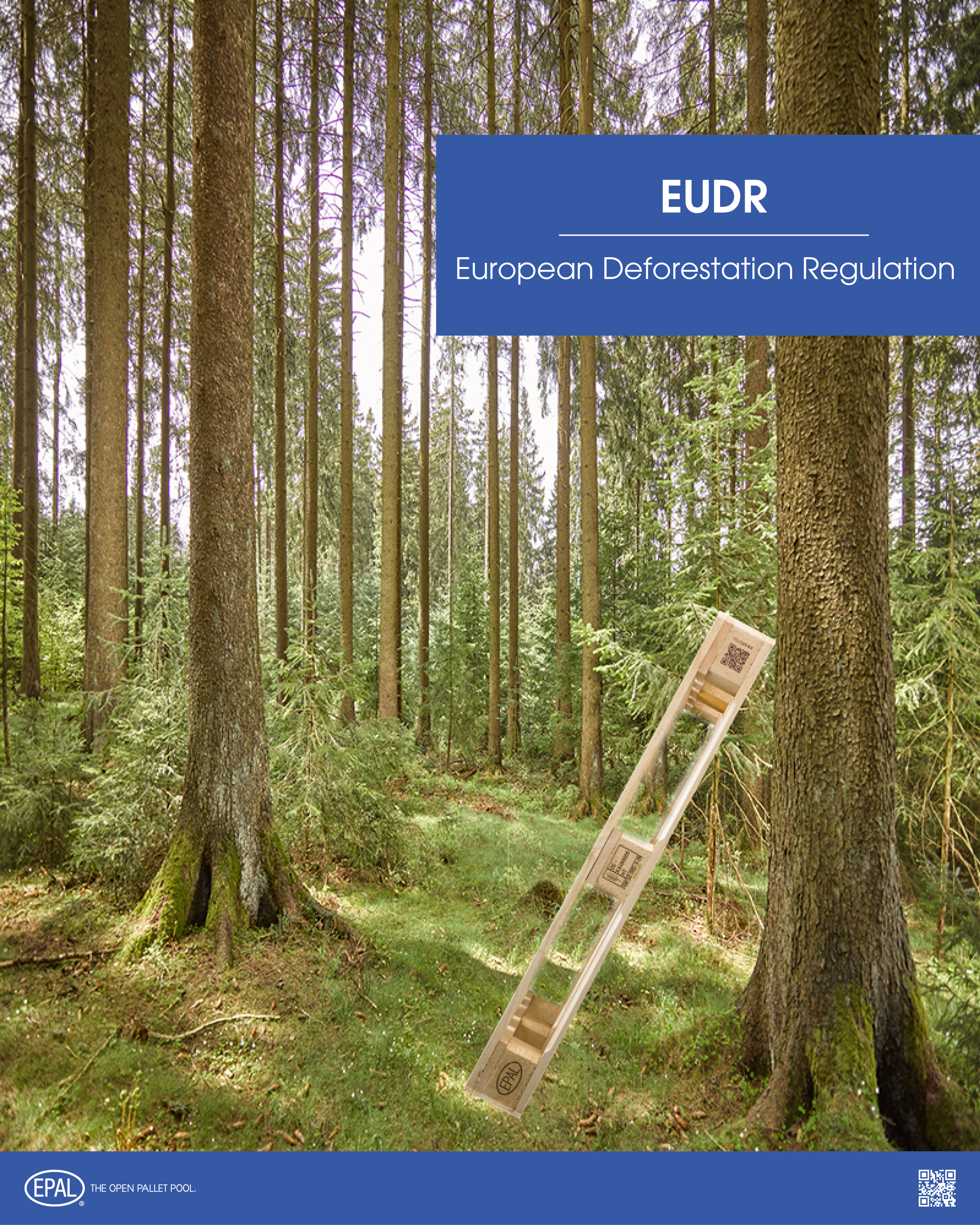EPAL publishes information on EUDR compliance for goods logistics on EPAL pallets and their exchange
Düsseldorf, 15 September 2025
The European Pallet Association e.V. (EPAL) has published information on the provisions of the EU Deforestation Regulation (EUDR) and explains that the EUDR does not impose any obligations or additional costs on users of EPAL pallets (Download: EUDR compliance of the use of EPAL pallets). In its letter, EPAL confirms that the regulation has no impact on the logistics processes of goods suppliers and recipients or on the exchange of EPAL pallets.
On 30.12.2025, the application of the EUDR will begin. As well as many other products, new EPAL pallets also fall within the scope of the EUDR. On the other hand, the EUDR does not apply to loaded EPAL pallets and used EPAL pallets. Users of new or used EPAL pallets therefore do not have to check the EUDR conformity of EPAL pallets when they deliver, receive or store goods on new or used EPAL pallets.
Jarek Maciążek, President of EPAL:
'Pallets loaded with goods are expressly excluded from the application of the EUDR. This means that the supplier of goods does not have to obtain information on the EUDR conformity of the EPAL pallets he uses or communicate it to the consignee. The recipients of goods on EPAL pallets are also not subject to EUDR obligations. For the users of EPAL pallets, the EUDR therefore does not result in any additional effort."
Due to the exemption of used pallets, EPAL pallet exchange and the management of empty pallets are also not affected by the EUDR. Users of EPAL pallets therefore do not have to comply with EUDR obligations when exchanging, selling and delivering used empty EPAL pallets.
Davide Dellavalle, Vice-President of EPAL:
“EPAL pallets are reused for many years. In order to extend the service life, used EPAL pallets are sorted and repaired. Both require the transport of empty pallets, even if the transport routes are very short due to the large number of EPAL companies and EPAL users. It is therefore important that this part of pallet logistics, i.e. the delivery and transport of empty EPAL pallets, is also not affected by the EUDR.”
EPAL supports the EUDR's goal of protecting forests from deforestation and forest degradation. The EUDR conformity of new EPAL pallets, which also applies to used EPAL pallets, will be guaranteed by the manufacturers of EPAL pallets in the future. They check and document the origin of the wood material and ensure that this is not associated with deforestation or forest damage.
Bernd Dörre, CEO of EPAL:
“Reusable EPAL wooden pallets are the most sustainable solution in pallet logistics. Especially in comparison with plastic pallets, the use of EPAL pallets offers companies from industry and trade a clear advantage in terms of carbon footprint and in avoiding environmental pollution caused by microplastics and plastic waste. With the EUDR conformity of EPAL pallets, users of EPAL pallets can now have even better confidence that the use and exchange of EPAL pallets optimally supports their companies' sustainability goals.”
Background:
The EUDR applies not only to timber products, but in particular to agricultural products such as coffee and cocoa, palm oil, soy, rubber and even animals (cattle). What all these products have in common is that forests were cleared on other continents in the past to produce them in order to gain arable land What all these products have in common is that, in the past, forests on other continents were cleared to make way for cultivation. This did not apply to wood. However, the European Timber Regulation (EUTR) has already applied to wood and wood products since 2010, which is now being replaced by the EUDR. Manufacturers of EPAL pallets are therefore already familiar with testing the origin, legality and sustainability of wood and wood products. What is new is that this no longer only applies to imports into the EU, but also to products manufactured or exported in the EU.
About EPAL:
The European Pallet Association e.V. (EPAL), founded in 1991, is an international non-profit association and organises the open EPAL pallet pool. More than 1,700 EPAL licensees produce and repair EPAL Euro pallets and other EPAL load carriers. Currently, more than 675 million EPAL Euro pallets and around 20 million EPAL box pallets are in circulation, which makes the EPAL pallet pool the largest open pallet exchange pool in the world.
With its principles of reusing, exchanging, repairing and recycling pallets, the open EPAL pallet pool has been a prime example of a sustainable circular economy for more than six decades. EPAL wooden Euro pallets make a significant contribution to climate protection. They store CO2, avoid waste, reduce the need for wood and thus improve the carbon footprint of users in industry, trade and logistics. EPAL Euro pallets are the backbone of the supply chains of industry, trade and logistics in Europe.
Further information for journalists:
European Pallet Association e.V. (EPAL)
Fabian Preuss (Communications Officer)
T +49 (0) 211 98 480 48 55
M +49 (0) 0152 55 33 62 88

